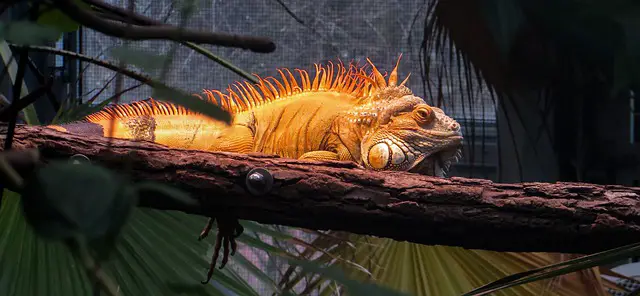It’s a question that has perplexed iguana enthusiasts for years: do iguanas turn black when they die? Unfortunately, there is no easy answer. It depends on various factors, including the circumstances of the iguana’s death and the individual iguana’s species and coloring.
In this blog post, we’ll explore the various factors that can influence an iguana’s post-death coloration so that you can be better informed the next time you’re confronted with this challenging question.
Iguana Death and Color Change: The Basics
When an iguana dies, its body starts to decompose. As decomposition sets in, the iguana’s skin begins to change color.
In some cases, the skin may turn black.
However, it’s essential to remember that not all iguanas will turn black when they die; the skin may change to various colors, including green, brown, and even pink.
There are a few factors that can influence an iguana’s post-death coloration.
The first is the circumstances of the iguana’s death.
If an iguana dies of natural causes, its skin is more likely to retain its original coloration. However, if the iguana dies suddenly or violently, its skin may change color more dramatically.
The second factor is the individual iguana’s species and coloring. Some species of iguanas are more prone to color change than others, and some unique iguanas have more pigment in their skin than others.
Do iguanas die easily?
Iguanas are not known for their longevity. In the wild, they typically only live for 10-12 years. In captivity, they may live a bit longer, but 15-20 years is still considered a pretty good lifespan for an iguana.
Several things can contribute to early death in iguanas.
Poor diet is one of the most common factors. Iguanas need a diet that is high in calcium and low in phosphorus, and many pet iguanas do not get the proper nutrients.
Another common cause of death is stress. Iguanas are very sensitive to changes in their environment, and even small changes can cause them great stress. If an iguana is consistently stressed, it can weaken its immune system and make it more susceptible to disease.
Finally, injuries can also be fatal for iguanas. Because they are reptiles, iguanas have a prolonged metabolism, and their bodies do not heal quickly.
A broken bone or internal injury can be complex for an iguana to recover. In general, iguanas are not particularly hardy creatures, and even minor problems can be deadly.
As a result, it is essential to monitor your iguana’s health carefully and consult with a veterinarian if you notice any changes.
Conclusion
As you can see, there is no easy answer to the question, “do iguanas turn black when they die?” The truth is that it depends on various factors, including the circumstances of death and the individual iguana’s species and coloring. Nevertheless, we hope this blog post has provided you with some helpful information you can use the next time you’re confronted with this challenging question.




